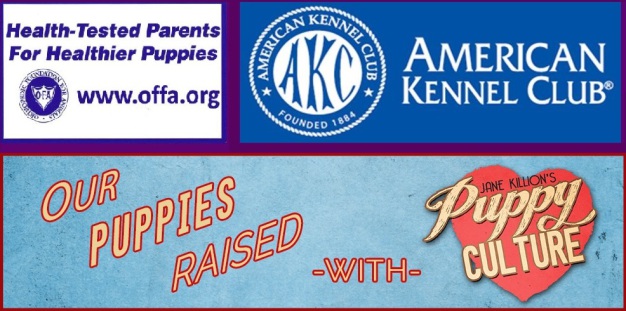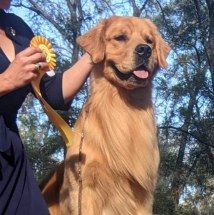
A Great Head Start...
~Our Nursery~
Rose Tree puppies are raised in our home using aspects from the Puppy Culture method, and are given the best head start possible with Early Neurological Stimulation and interactive concepts that promote brain development and mental enrichment. They are exposed to every day life from the beginning - our children, dogs, cats, & once old enough they get to venture outside safely in view of cows, chickens and other interesting sights, sounds, & smells. They are desensitized to normal household noises like vacuums and radio, & come well started on potty training for a smooth transition into their new family. Socialization is our #1 priority to make sure each puppy gets the best possible start in life during this critical time.
From Day 1, we are involved in handling the puppies. They are interacted with from birth and weighed daily for the first few weeks to ensure they're thriving. Starting on Day 3, we begin Early Neurological Stimulation. This method is comprised of 5 exercises that, when performed daily between Days 3-16, has been shown to have a lifetime impact on the following:
- Improved cardiovascular performance
- Stronger heart beats
- Stronger adrenal glands
- More tolerance to stress
- Greater resistance to disease
The 5 exercises include:
- Tactical stimulation (stroking between toes with Q-tip)
- Head held erect (puppy held in upright position)
- Head pointed down (puppy held with head pointed down)
- Supine Position (puppy held on back)
- Thermal stimulation (puppy placed feet down on cool washcloth)
The exercises are done for 5 seconds each, every day until Day 16. By then, puppies have eyes open and are starting to walk and explore their environment. From that point on, we introduce new objects to the whelping box each day - crinkle toys, plastic water bottles, rattles, interactive story-telling stuffed animals...everything we place in the whelping box is interesting to them!
Weeks 1-3 are quiet, calm, and cozy in our nursery. For the first three weeks of the puppies' lives, I sleep right next to the whelping box to keep an eye on the dam and her puppies. We monitor the litter 24 hours a day to make sure that no one is accidentally laid on, pushed aside during meal time, or too cold/too hot. Puppies are born blind and deaf, so it is extremely important that they are kept under close watch during those first few critical weeks. I am also right there with the mother helping her tend to her babies and recover from the whelping. The early weeks are spent cuddling, doing ENS exercises as described above, weighing puppies, deworming, & trimming nails. By the end of the third week, the puppies have gone from deaf & blind little creatures that scoot around seeking heat and a nipple to an active puppy that can see, hear, walk, play and are starting to run. Time to upgrade!
At 3 weeks old, the puppies graduate from the whelping box to the puppy pen. We start with a smaller area...about 5x6ft... and introduce a litter pan. Once the babies have gotten the hang of using the litter pan consistently (usually within a week), their pen gets expanded little by little. By 6.5-7 weeks old, they usually have the run of the whole 10x12ft room. Our nursery is filled with interactive toys and equipment that changes every few days. Some of the items we place in there include a tunnel, soft gym climber, sensory gym with hanging toys, stuffed animals, wobble board, ball pit, etc. We also let them experience different footing surfaces. Astro-turf, linoleum, tile, blanket, shag rug, wood, etc.
At 3 weeks old we also introduce food - a sloppy mixture of blended Purina ProPlan and goat's milk yogurt to start. The first meal is always very messy and adorable! As they grow, we use meal time to introduce mild challenges to the puppies for even more mental stimulation - sometimes they'll have to climb over or go around a barrier to reach their food dish. Other days they have to use their nose to find the food. These exercises mold their brains and have lasting positive effects throughout their lives. As the puppies get older, we incorporate small amounts of a variety of foods - raw meat as well as healthy veggies - into their ProPlan puppy food and goat's yogurt meals. They love the variety and we like that it gets their digestive systems used to different foods.
When puppies are 5 weeks old, we start taking them outside for supervised play in our yard. They thoroughly enjoy this! Our fenced puppy area includes tunnels, ramps, slides, a puppy clubhouse and a ball pit. Weather permitting we also introduce them to water with our baby pool. Their outdoor play exposes them to a whole new set of sights, sounds, and smells, and also solidifies what we started indoors for potty training.
At 5-6 weeks, the babies start spending more time outside of the nursery to explore our living room, dining room, and kitchen. A vacuum cleaner may be turned on and left running while puppies are playing in the same room. I sweep the floor and run the dishwasher. We play music or turn the T.V. on to expose them to different sounds. Friends visit to socialize the litter, and families who are receiving a puppy from the litter get to meet the babies for the first time. Our other adult dogs are introduced for supervised play, and teach them a lot about dog behavior and communication. We also take the puppies for short car rides. They learn about daily life pretty quickly and by 8 weeks are well adjusted to just about anything they will face in their new homes.
At 7 weeks old, each puppy undergoes an individual Temperament Evaluation away from littermates. We use the Volhard test for this and it consists of 10 exercises performed by someone the pups don't know. Exercises include things like opening an umbrella next to them, dropping something loud, and encouraging them to follow a stranger. Each response is scored and we use their test scores as one part of our Puppy Placement process when matching puppies with their new homes. By using the Volhard test and watching/interacting with the puppies daily from birth, we have a good idea of what type of home each puppy will be suited for.
**The link for the Volhard test is on our Links Tab if you would like to read more about it.**
Between 7 and 8 weeks, we evaluate structure and pick any show potential puppies. After the show pups are chosen, it's time to place the remaining puppies into appropriate homes. I evaluate each of the pet families' questionnaire and lifestyle, and compare it to the puppies' temperament test results and my own observations while raising the litter. Using these pieces of information, I pair each family with the puppy that suites it best. As their breeder and caregiver, I know my puppies better than anyone, which is why I choose placements rather than letting my puppy families pick their own puppy. Our placement process works well and I have consistently received positive feedback from families who are grateful to us for choosing the perfect golden for their lifestyle.
Puppies are ready to go home to their new family at 8 weeks with first shots, regular de-worming, veterinary checkup, 2 year health guarantee, puppy bag with food, toys, blanket, & information on potty training & other helpful resources, & copies of pedigree, vet exam, parents’ health clearances, spay/neuter agreement, & AKC limited registration.
Lifetime support from us is also included – we stand by our goldens & want to keep in touch with our owners. We are here for you when you have questions, need pet sitting or grooming, or just want to share pictures and stories of your RTG golden as they grow. We host an annual dock diving party for all of our puppy families to reconnect littermates and friends. We will ALWAYS accept back a dog we have bred, no matter the circumstances...in fact, we require it if you can no longer care for them at any point during their lives. We brought them into this world intentionally & with love, & stand by them for life.






